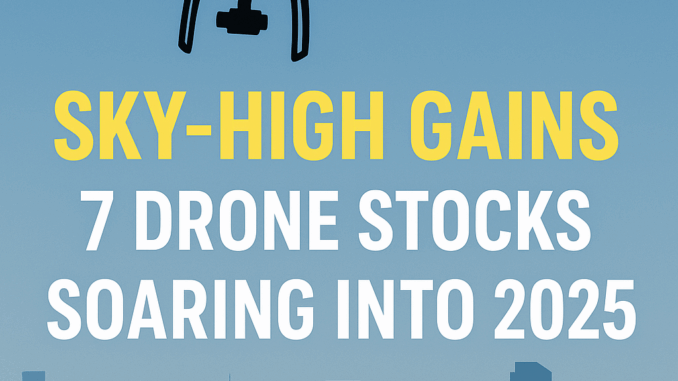
The commercial and defense drone industries are flying high in 2025, with innovations transforming everything from battlefield surveillance to last-mile delivery. As adoption accelerates across sectors—military, logistics, agriculture, and even urban air mobility—investors are turning their eyes to drone technology stocks that have the potential to soar. Whether you’re looking for growth in AI-powered defense or speculative exposure to flying taxis, these seven drone stocks offer exposure to the next generation of aerial innovation.
1. AeroVironment (AVAV): Tactical Drone Leader for Defense
AeroVironment is one of the most recognized names in military-grade drones. Known for small, hand-launched systems like the RQ-20 Puma and Switchblade, AVAV is a core supplier to the U.S. Department of Defense and allies. In a world where drone warfare has gone from futuristic to frontline, AeroVironment’s battlefield-tested tech is in high demand.
The company has also expanded into AI-enabled autonomous flight systems and continues to win major contracts. In 2024, AeroVironment reported record backlog growth, signaling strong momentum into 2025. As conflicts shift and modernize, AVAV’s position in the unmanned defense ecosystem gives it staying power.
2. EHang Holdings (EH): Autonomous Passenger Drones
China-based EHang is one of the few public companies focused entirely on autonomous aerial vehicles (AAVs) designed to carry people. Its flagship EH216 flying taxi continues to progress through regulatory frameworks, including certifications from China’s Civil Aviation Administration.
While riskier than traditional defense contractors, EHang holds first-mover potential in the urban air mobility (UAM) sector. Investors bullish on futuristic transport should watch EH closely as more countries begin laying groundwork for aerial ride-sharing and cargo services.
3. Kratos Defense & Security (KTOS): Jet-Powered Autonomy
Kratos is pushing boundaries with its high-performance, reusable military drones like the XQ-58A Valkyrie. These stealthy, autonomous systems are designed to fly alongside manned aircraft, and Kratos is carving out a unique space at the intersection of AI and national defense.
The company has diversified across target drones, space systems, and missile defense, but its unmanned aerial vehicle division has become a major driver of investor interest. KTOS also offers exposure to U.S. defense spending and next-gen air combat tech.
4. Ondas Holdings (ONDS): Drone-as-a-Service Infrastructure
Ondas Holdings has taken a software-first approach to drones, building an ecosystem for automated aerial data capture. Through its acquisition of Airobotics and American Robotics, ONDS is delivering autonomous drone platforms for smart cities, industrial inspections, and emergency response.
With FAA approvals already secured for beyond visual line of sight (BVLOS) operations, Ondas is pushing ahead in an industry where many are still stuck in regulatory limbo. The company is also expanding into global infrastructure and port surveillance use cases.
5. Red Cat Holdings (RCAT): Tactical and Commercial Dual Play
Red Cat Holdings may be a small-cap name, but it’s quietly building a niche in military and commercial drone hardware. Its subsidiary, Teal Drones, produces lightweight, rugged drones for defense clients—including night vision-equipped models for tactical use.
In 2024, the company won a major contract from the U.S. Army, validating its capabilities in a highly competitive space. With a growing backlog and new partnerships, RCAT offers asymmetric upside as a smaller player gaining traction.
6. Teledyne Technologies (TDY): Eyes in the Sky and Underwater
Though not a pure drone company, Teledyne provides sensors and imaging technologies that power high-end UAVs and unmanned underwater vehicles. Its advanced optics and LIDAR systems are used in aerospace, defense, and scientific exploration.
For investors looking for drone-adjacent exposure through a more diversified tech and industrial company, Teledyne offers stability with innovation. TDY’s M&A strategy has also kept it on the cutting edge of autonomous systems.
7. Joby Aviation (JOBY): Electric Aerial Mobility Pioneer
Joby is among the most well-known companies developing electric vertical takeoff and landing (eVTOL) aircraft. With backing from Toyota and a strategic partnership with the U.S. Air Force, Joby is working to commercialize flying taxis for urban travel and defense logistics.
While still pre-revenue and speculative, Joby is arguably the market leader in the aerial mobility race. As regulations evolve and public-private partnerships expand, JOBY could emerge as the Tesla of the skies.
Final Approach: The Drone Future Is Now
Drone technology is no longer just for sci-fi films or battlefield operations. From civilian logistics to military autonomy and urban transport, unmanned aerial systems are poised to become a central part of global infrastructure. These seven stocks represent a mix of established players, up-and-comers, and high-risk disruptors in a sector that’s moving at jet speed.
As always, do your own due diligence and consider your risk tolerance. But if you’re looking to invest in the aerial future, now’s the time to start building your drone-powered portfolio.



Be the first to comment